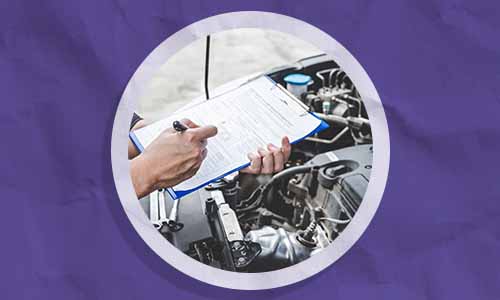How much does it cost to replace an alternator?
Industry data shows that the average cost to replace an alternator in the UK is around £525.
However, costs vary widely, with online sources citing prices between £100 and £800. In this guide, we’ll define this key component and break down the various factors that influence alternator repair and replacement costs.
We’ll also cover the telltale signs of a failing alternator. Finally, we’ll share ballpark repair and replacement costs to help you make an informed decision, whether you’re looking to sell your car, or keep it running reliably for the years ahead.
Get a free valuation
What is an alternator and how does it work?
Alternators are responsible for converting mechanical energy into the electrical energy that’s stored within the battery.
An alternator also charges your car battery, helping to prevent depletion and breakdowns. The power it supplies goes to key components such as the headlights, air conditioning, power windows, and infotainment system.
When you switch on the ignition, your car powers the drive belt (also known as the ‘serpentine’ or ‘auxiliary drive belt’), which rests on a pulley attached to the alternator.
This pulley turns the alternator’s rotor shaft, which spins a set of magnets within a coil. This creates an alternating current (AC) in the stator.
The current is channelled into the rectifier within the alternator – and the AC energy is converted into direct current (DC) energy, which activates the car’s electrical systems.
What are the different types of alternators?
Standard/OEM alternators
- These are the original alternators fitted by the manufacturer.
- They are designed to meet the electrical needs of a standard, unmodified car.
- Standard alternators typically produce between 65 and 100 amps, with a 10-15% reserve capacity to safely handle standard electricity usage.
- A like-for-like OEM alternator is usually the most economical choice for alternator replacement.
Typical cost (part only): £100 to £200
High output alternators
- High output alternators are designed to deliver more power and efficiency and are ideal for cars with higher electrical demand.
- If your car draws more power than most, you should opt for an alternator with at least 50% more output than the total power demand.
- Whilst costlier than standard equivalents, high output alternators help to prevent overload in the battery and wiring - and may also boost fuel economy.
Typical cost (part only): £200 to £500
Performance/specialty alternators
- These high-end alternators are designed for cars with very high electrical demand.
- You will usually only require a performance/speciality alternator if your car is heavily customised with performance modifications.
Typical cost (part only): £300 to £800
Alternator technologies
Fixed voltage
- Many older car models use a simple, fixed voltage alternator, which provides a constant voltage.
- Fixed voltage alternators can be tested with a multimeter. Ideally, a healthy alternator should show a reading of 13-15 volts when the engine is running.
- If the voltage falls below 13 volts at 2,000 RPM, this may indicate the alternator is failing.
Smart alternators
- Often used for newer cars, particularly those with start/stop technology.
- Smart alternators adjust their output based on the driving conditions, helping to deliver better fuel efficiency.
- Some advanced systems even combine the starter motor and the alternator. Both components are controlled by a dedicated engine control unit (ECU).
- Smart alternators are usually more expensive to source and replace than the older fixed voltage variety.
Alternator replacement cost factors
Choice of alternator
The type of alternator you choose (standard, high-output, or performance/specialist) will affect the overall cost. Pricing will also depend on whether it’s a traditional fixed-output model or a more advanced smart alternator.
Labour costs are usually higher for more advanced systems due to the complexity of the installation process.
Vehicle type
The make and model of your car will influence alternator replacement costs. You’ll usually pay less for economical cars and more for prestigious and performance models.
Labour costs
Labour costs for alternator replacement can vary significantly but the typical cost for an alternator replacement ranges from £150 to £300.
Here are some ballpark hourly rates for different garage types:
- Independent garages: £50 to £100 per hour
- Manufacturer dealerships: £80 to £100 per hour
- Specialised auto shops: £60 to £120 per hour
The average rate in London is £78 per hour – and slightly lower at £72 per hour outside the capital.
Independent garages tend to be cheaper than authorised service centres and franchise dealers. However, some warranties require repairs to be carried out at specific authorised garages or dealerships.
Installation complexity
Standard alternators are typically less expensive to source and install than higher output or performance alternatives.
If the alternator is in a difficult spot and access requires removing other engine components, labour costs will increase due to the extra time required.
If other parts also need to be replaced, this will further increase the installation time and cost.
Alternator replacement costs by manufacturer
According to data from automotive finance provider, Bumper, the average cost for alternator replacement in the UK is £525.
Here are some ballpark costs for some of the most popular car models on UK roads:
| Car model | Average new alternator cost |
|---|---|
| BMW 1 Series | £690 |
| BMW 3 Series | £605 |
| Ford Fiesta | £490 |
| Ford Focus | £490 |
| Nissan Qashqai | £510 |
| Range Rover Evoque | £650 |
| Vauxhall Astra | £470 |
| Vauxhall Corsa | £470 |
| Volkswagen Golf | £510 |
| Volkswagen Polo | £500 |
How long does it take to replace an alternator?
Alternator replacement typically takes between 1 and 2.5 hours.
| Car model | Alternator replacement time |
|---|---|
| Ford Fiesta | 42 minutes |
| Audi Q5 | 42 minutes |
| Audi A4 | 54 minutes |
| BMW 5 Series | 57 minutes |
| Volkswagen Golf | 1 hour |
| Fiat 500 | 1 hour 3 minutes |
| Volkswagen Tiguan | 1 hour 6 minutes |
| Mercedes-Benz C-Class | 3 hours 42 minutes |
| Land Rover Range Rover | 3 hours 42 minutes |
The time taken may vary due to factors such as the engine layout, the complexity of the component, and garage’s workload. The timeframe may be extended if additional repairs or parts are required.
How long does an alternator last?
Alternators typically last between 80,000 and 150,000 miles, which often translates to 7 to 12 years of use.
However, it is possible for a well-maintained alternator to last for 20 years or more!
What factors affect an alternator’s lifespan?
Driving conditions: Exposure to harsh weather, hot or cold temperatures, regular short trips, and frequent driving in stop/start traffic can place a strain on the alternator and reduce its lifespan.
Build quality: Lower-quality alternators with cheaper components are likely to have shorter lifespans than studier equivalents.
Electrical strain: Typical alternators operate at 65 to 100 amps, which is more than enough to meet the requirements of a standard car. Most alternators are designed to carry a reserve of 10-15% to run safely.
However, certain aftermarket accessories, modifications, and electronic devices can push an alternator beyond its intended limits and accelerate wear.
Battery health: A healthy car battery helps the alternator to run safely and efficiently for longer. Conversely, any battery issues can also expedite the decline of the alternator.
Belt tension: It’s crucial to ensure that the tension in the alternator belt (also known as the ‘drive’ or ‘serpentine’ belt) is correct. If it’s too slack or tight, this can affect performance and cause premature wear.
Vehicle care and driving habits: Keeping up with your car’s maintenance and servicing schedule can go a long way towards prolonging the life of your alternator.
Driving with care and avoiding harsh braking and acceleration can also reduce strain on the alternator and related components.
Can I replace my alternator at home?
It is possible for a skilled home mechanic to replace an alternator – and it is often simpler for older models. However, replacing a modern ‘smart’ alternator is trickier and requires testing with specialised equipment such as an oscilloscope.
If you choose to replace your alternator at home, you could save between £50 and £300 in garage fees.
Remember, you shouldn’t attempt this without a good mechanical knowledge or the necessary equipment. Otherwise, you’ll run the risk of damaging the car or injuring yourself.
How to replace an alternator at home (step-by-step)
Here’s a rough guide to removing your alternator at home.
Required tools: Torque wrench, floor jack, rachet and sockets, axle stands, and assorted screwdrivers.
Timeframe: Approximately 2-3 hours
- Disconnect the battery. This is crucial to avoid grounding a live wire.
- Disconnect the wires from the back of the alternator. Consider labelling them as you remove them if you’re unsure where they need to go back.
- Remove the belt from the pulley. This requires moving the tensioner enough to slip the belt from the pulley.
- Spring-loaded GM tensioners can be pulled back with a wrench. Alternatively, if your car has a screw-type or rod-end tensioner, you can turn the bolt/rod-end with a wrench or socket, until it’s loose enough to remove the belt.
- Next, remove the bolts that connect the alternator to the bracket.
- After removing the old alternator, you just need to follow the previous steps in reverse.
DIY vs professional alternator replacement
| DIY replacement | Professional replacement | |
|---|---|---|
| Cost | Cheaper. You’ll only pay for the parts. | More expensive. Also includes labour costs. |
| Time | Typically takes 2-3 hours. | Faster. Usually takes 1-2 hours. |
| Skill required | Requires a solid mechanical knowledge. | None. Handled by trained mechanics. |
| Tools required | Torque wrench, floor jack, rachet and sockets, axle stands, and assorted screwdrivers. | None. |
| Risks | Higher. Mistakes can cause costly damage to your car and its components. | Low. Professional mechanics adhere to safe practices. |
| Warranty | DIY repairs and installation may invalidate your car’s warranty. | When carried out at a reputable/approved garage, your warranty should be intact. |
Signs of a failing alternator
Problems starting and frequent stalling
Your car may struggle to start, with the engine producing a clicking sound, rather than a healthy whirr. The car could stall if the alternator is unable to provide enough current for the spark plugs.
Battery issues
If your battery regularly dies or is unable to hold a charge, this could be down to a faulty alternator. When the alternator isn’t working correctly, the battery may die because it isn’t being recharged as you drive.
Warning lights
If you see the battery warning light on the dashboard, this can indicate an issue with your car’s electrical system, which includes the alternator. The ‘check engine’ light may also appear if the vehicle isn’t getting enough power.
Burning rubber smell:If you smell burning rubber, this could also mean the belt is slipping.
Electrical malfunctions: If electrical components such as the seat adjusters, lighting system, or power windows malfunction, a faulty alternator could be the culprit.
Growling or squeaking sounds: Growling and squeaking sounds from the engine bay may be caused by failing alternator bearings or an alternator belt issue. Squeaking sounds are often caused by a worn or broken alternator belt.
A visibly damaged alternator belt: If you inspect the alternator belt, check for any small cracks. These indicate that the belt is worn and should be replaced promptly before it snaps.
High engine temperature and power steering failure: Automotive community posters have noted that a broken alternator belt can increase engine temperature - and cause the power steering and air conditioning systems to fail.
What are the symptoms of an overcharging alternator?
Alternators can sometimes ‘overcharge’ the system. When this happens, you may notice the following issues:
Flickering lights
Flickering or unusually bright lights (which can cause bulbs to blow) are signs of an overcharging alternator.
Battery warning/check engine light
The battery warning light may appear on the dashboard if the alternator is not providing the correct voltage to charge your car battery optimally. The ‘check engine’ light may also appear when there is an issue with the alternator or the battery.
Battery swelling and leakage
The battery may bulge or swell due to boiling electrolytes and gas generation – and this may be accompanied by surface leakage.
High battery voltage
You can check the voltage of the battery with a multimeter. If you get a reading of 14.7-15V or higher with the engine running, this could mean you’re dealing with an overcharging alternator.
Why do alternators fail?
Common causes of alternator failure include:
- Long-term wear and tear.
- Broken belts and/or pulleys.
- Worn-out bearings
- Fluid leaks elsewhere (can cause damage to the alternator belt).
- Poor battery health.
- Excessive electrical load.
- Overuse of power-hungry aftermarket accessories.
- Incorrect alternator belt tension.
- Voltage regulator and transistor malfunction (leads to overcharging).
Can you drive with a broken alternator belt?
Driving with a broken alternator belt is not recommended.
Although it is often possible to drive when the belt is broken, any electrical systems will rely solely on the remaining car battery power. When this energy is exhausted, most modern cars will disable all electronics to prevent serious damage.
Should I repair or replace my alternator?
Whilst certain alternator issues such as worn brushes may be repairable, in most cases, replacement is the best option.
The internal parts of an alternator are not readily available and would need to be specially ordered.
Once you factor in the additional labour costs associated with stripping down, cleaning, and rebuilding the alternator, it’s likely that your garage bill will exceed the cost of simply replacing the whole alternator.
What’s more, if your car needs complex alternator repairs, it’s likely to be out of action for longer. Opting for replacement usually keeps any disruption to a minimum.
Which components may need replacement alongside the alternator?
Alternator belt
This should ideally be replaced at the same time as the alternator to maximise performance and help prevent future issues.
The alternator belt drives the alternator, along with other key components such as the power steering system, water pump, and air conditioning compressor.
Battery
Both the battery and alternator are responsible for powering your car’s electrical systems.
If the battery is relatively new and holds a charge well, replacing it may not be necessary. However, if it has been damaged by the alternator, it will need to be replaced alongside it to prevent further issues.
Belt tensioner and pulley
A healthy tensioner and pulley is crucial for maintaining the correct belt tension. The belt tensioner and pulley should also be replaced if they show sign of wear.
They’re relatively cheap to replace, and if the mechanic needs to remove parts to access the alternator, replacing the tensioner and pulley at the same time can provide significant savings on labour costs.
Wiring and fuses
If you’re upgrading to a higher-output alternator, you’ll likely need to upgrade the wiring to a thicker gauge (and use larger fuses) to ensure your car can safely handle the extra power.
Stop/start system
Cars with stop/start technology place greater strain on the electrical system - and tend to use more advanced alternators and other specialised components.
These systems don’t always need to be replaced with the alternator, but if they do, this increases the complexity of the job. Replacing items such as the ECU or capacitors can significantly increase parts and labour costs.
Cost-saving tips
- Shop around and obtain multiple quotes from various garages (e.g. independent and manufacturer service centres). Pay attention to online reviews as well as the price when making your decision.
- If you’re shopping for parts yourself, paying slightly more for a higher quality component can save you money in the long run.
- If your car is still under warranty, check the terms to see whether you’ll be covered for the repair costs.
- Agree on a fixed price with the mechanic before committing to the repairs, so you know exactly how much you’ll be spending.
Frequently Asked Questions
While you don’t always need to stop driving immediately when you notice the signs of an overcharging alternator, we recommend visiting a mechanic as soon as possible.
When these issues are left unchecked, there’s an increased risk of electrical components failing and permanent battery damage.
Whilst it may be possible to drive for a short period on battery power alone, this is not recommended.
The risk of breaking down and causing damage to other components is greatly increased, so you should take your car to a mechanic as soon as possible.











